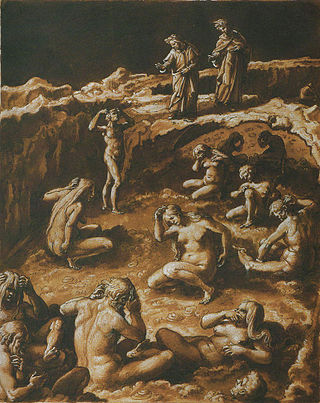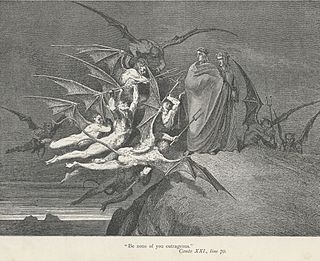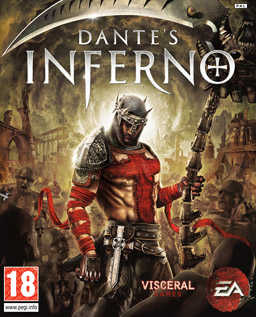Scarmiglione is one of the twelve named Malebranche in the 8th Circle of Hell's 5th Gulf, where corrupt politicians are immersed in burning pitch, the Malebolge, from the Inferno of Dante Alighieri's Divine Comedy .
Scarmiglione is one of the twelve named Malebranche in the 8th Circle of Hell's 5th Gulf, where corrupt politicians are immersed in burning pitch, the Malebolge, from the Inferno of Dante Alighieri's Divine Comedy .

The Divine Comedy is an Italian narrative poem by Dante Alighieri, begun c. 1308 and completed around 1321, shortly before the author's death. It is widely considered the pre-eminent work in Italian literature and one of the greatest works of Western literature. The poem's imaginative vision of the afterlife is representative of the medieval worldview as it existed in the Western Church by the 14th century. It helped establish the Tuscan language, in which it is written, as the standardized Italian language. It is divided into three parts: Inferno, Purgatorio, and Paradiso.
Inferno may refer to:

In Greek mythology, Nessus was a famous centaur who was killed by Heracles, and whose poisoned blood in turn killed Heracles. He was the son of Centauros. He fought in the battle with the Lapiths and became a ferryman on the river Euenos.
Barbariccia is one of the demons in the Inferno of Dante Alighieri's Divine Comedy. Barbariccia is one of the Malebranche, whose mission is to guard Bolgia Five in the Eighth Circle, the Malebolge. Barbariccia's name means "curly beard" in Italian. Barbariccia seems to be the most important devil after Malacoda as he becomes the "provost" of nine other devils, when Malacoda commands them to escort Dante and Virgil, which can be read out of the following text :

In Dante Alighieri's Inferno, part of the Divine Comedy, Malebolge or Fraud is the eighth circle of Hell. Roughly translated from Italian, Malebolge means "evil ditches". Malebolge is a large, funnel-shaped cavern, itself divided into ten concentric circular trenches or ditches. Each trench is called a bolgia. Long causeway bridges run from the outer circumference of Malebolge to its center, pictured as spokes on a wheel. At the center of Malebolge is the ninth and final circle of hell, known as Cocytus.
The Devil, appears frequently as a character in literature and various other media. In Abrahamic religions, the figure of the Devil, Satan personifies evil.

Ciampolo is the accepted name of a character in Dante's Divine Comedy.

The Divine Comedy has been a source of inspiration for artists, musicians, and authors since its appearance in the late 13th and early 14th centuries. Works are included here if they have been described by scholars as relating substantially in their structure or content to the Divine Comedy.

Malacoda is a character in Dante Alighieri's Inferno, where he features as the leader of the Malebranche, the twelve demons who guard Bolgia Five of Malebolge, the eighth circle of Hell. The name Malacoda is roughly equivalent to "bad tail" or "evil tail" in Italian. Unlike other characters such as Geryon, which are based on mythical characters, Malacoda was invented by Dante and is not a mythological reference.

Dante's Inferno is a 2010 action-adventure hack and slash video game developed by Visceral Games and published by Electronic Arts. The game was released for PlayStation 3, Xbox 360 and PlayStation Portable in February 2010. The PlayStation Portable version was developed by Artificial Mind and Movement.

Inferno is the first part of Italian writer Dante Alighieri's 14th-century epic poem Divine Comedy. It is followed by Purgatorio and Paradiso. The Inferno describes Dante's journey through Hell, guided by the ancient Roman poet Virgil. In the poem, Hell is depicted as nine concentric circles of torment located within the Earth; it is the "realm ... of those who have rejected spiritual values by yielding to bestial appetites or violence, or by perverting their human intellect to fraud or malice against their fellowmen". As an allegory, the Divine Comedy represents the journey of the soul toward God, with the Inferno describing the recognition and rejection of sin.

Paradiso is the third and final part of Dante's Divine Comedy, following the Inferno and the Purgatorio. It is an allegory telling of Dante's journey through Heaven, guided by Beatrice, who symbolises theology. In the poem, Paradise is depicted as a series of concentric spheres surrounding the Earth, consisting of the Moon, Mercury, Venus, the Sun, Mars, Jupiter, Saturn, the Fixed Stars, the Primum Mobile and finally, the Empyrean. It was written in the early 14th century. Allegorically, the poem represents the soul's ascent to God.
Calcabrina is one of the demons featured in Inferno, the first canticle of Dante Alighieri's Divine Comedy. Calcabrina's name is possibly meant to mean "grace-stomper" or "frost trampler."

The Malebranche are the demons in the Inferno of Dante's Divine Comedy who guard Bolgia Five of the Eighth Circle (Malebolge). They figure in Cantos XXI, XXII, and XXIII. Vulgar and quarrelsome, their duty is to force the corrupt politicians (barrators) to stay under the surface of a boiling lake of pitch.

Alichino is one of the devils in the Inferno of Dante Alighieri's Divine Comedy. Alichino is a member of the Malebranche, whose mission is to guard Bolgia Five in the Eighth Circle, the Malebolge. Alichino's name is commonly regarded as a garbled version of the Italian word for harlequin, Arlecchino, perhaps for his flying attempt to catch Ciampolo of Navarre in his escape. His only significant contribution to the plot is when he persuades the other devils to leave Ciampolo of Navarre alone. Ciampolo is supposed to summon other sinners from the lake of boiling pitch, on request by Dante. But Ciampolo doesn't call at his friends. Instead, he fools the devils and escapes back to the lake, and Alichino tries in vain to catch him. This causes a fight between Alichino and Calcabrina, which causes them to fall into the lake. The other devils put the blame on Virgil and Dante, though and hunt them vexed.

Paolo and Francesca da Rimini is a watercolour by British artist and poet Dante Gabriel Rossetti, painted in 1855 and now in Tate Britain.

Guido Guerra V (1220-1272) was a politician from Florence, Italy. Aligned with the Guelph faction, Guerra had a prominent role in the political conflicts of mid-thirteenth century Tuscany. He was admired by Dante Alighieri, who granted him honor in the Divine Comedy, even though he placed Guerra in Hell among sinners of sodomy.

Inferno is an opera based on Dante's Divine Comedy with music by Lucia Ronchetti. The libretto mostly by the composer uses much of Dante's poetry. Commissioned by the Oper Frankfurt, the opera was first performed in a concert performance at the Bockenheimer Depot on 27 June 2021, conducted by Tito Ceccherini.

The first circle of hell is depicted in Dante Alighieri's 14th-century poem Inferno, the first part of the Divine Comedy. Inferno tells the story of Dante's journey through a vision of hell ordered into nine circles corresponding to classifications of sin. The first circle is Limbo, the space reserved for those souls who died before baptism and for those who hail from non-Christian cultures. They live eternally in a castle set on a verdant landscape, but forever removed from heaven.